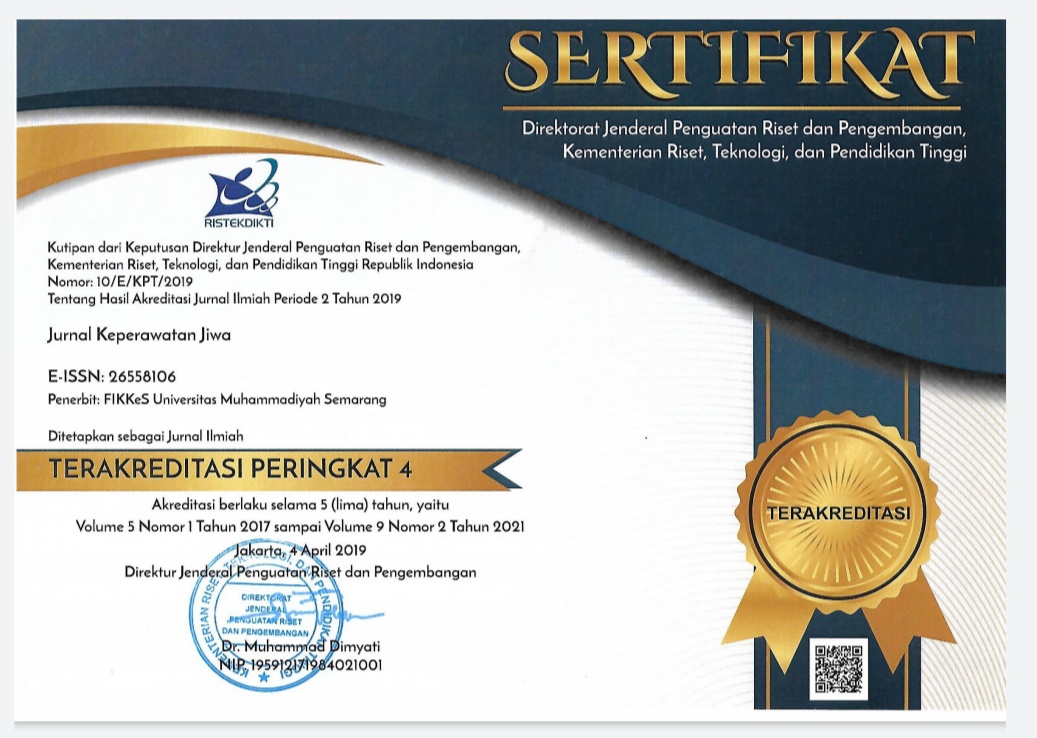Fenomena Bermain Game dan Kejadian Internet Gaming Disorder (IGD) pada Remaja
(1) Sekolah Tinggi Ilmu Kesehatan Kepanjen
(2) Sekolah Tinggi Ilmu Kesehatan Kepanjen
(3) Sekolah Tinggi Ilmu Kesehatan Kepanjen
(*) Corresponding Author
Abstract
Game adalah salah satu kegiatan rekreasi paling umum tanpa memandang budaya, usia, dan jenis kelamin, terutama sejak perkembangan internet. Bermain game yang bisa dilakukan bisa dilakukan secara online dan offline. Adapun bermain game online bisa menyebabkan kejadian Intenet Gaming Disoder (IGD). Penelitian ini bertujuan untuk mengetahui tentang fenomena bermain game pada remaja Sekolah Menengah Pertama dan Sekolah Menengah Atas dan kejadian Intenet Gaming Disoder (IGD). Penelitian ini menggunakan desain cross sectional dengan populasi dan sampel adalah remaja Sekolah Menengah Pertama dan Sekolah Menengah Atas. Pengumpulan data dilakukan selama 1 minggu dengan menggunakan google form dan assessment terhadap internet gaming disorder adalah berdasarkan DSM-5 yang diadaptasi dari Video Game Dependency Scale yang meliputi 9 kriteria dari internet gaming disorder. Hasil Penelitian disajikan dalam bentuk tabel distribusi frekuensi dan narasi. Dari 132 responden terdapat 40 remaja bermain game online, 63 bermain game offline dan 29 remaja bermain game online dan offline. Dari 40 remaja yang bermain game online tidak didapatkan kejadian Intenet Gaming Disoder (IGD). Diperlukan kehadiran orang tua secara emosional dan keluarga yang nyaman serta adanya upaya sosialisasi berkaitan dengan pengunaan waktu bermain game sebagai antisipasi dampak negatif bermain game sehingga game tidak mengganggu kehidupan.
Keywords
Full Text:
PDFReferences
Dindar, M. (2018). An empirical study on gender, video game play, academic success and complex problem solving skills. Computers and Education, 125, 39–52. https://doi.org/10.1016/j.compedu.2018.05.018
Beard, C. L., & Wickham, R. E. (2016). Gaming-contingent self-worth, gaming motivation, and Internet Gaming Disorder. Computers in Human Behavior, 61, 507–515. https://doi.org/10.1016/j.chb.2016.03.046
Dong, G., Wang, Z., Wang, Y., Du, X., & Potenza, M. N. (2019). Gender-related functional connectivity and craving during gaming and immediate abstinence during a mandatory break: Implications for development and progression of internet gaming disorder. Progress in Neuro-Psychopharmacology and Biological Psychiatry, 88, 1–10. https://doi.org/10.1016/j.pnpbp.2018.04.009
Hawi, N. S., & Samaha, M. (2017). Validation of the Arabic Version of the Internet Gaming Disorder-20 Test. Cyberpsychology, Behavior, and Social Networking, 20(4), 268–272. https://doi.org/10.1089/cyber.2016.0493
Hawi, N. S., Samaha, M., & Griffiths, M. D. (2018). Internet gaming disorder in Lebanon: Relationships with age, sleep habits, and academic achievement. Journal of Behavioral Addictions, 7(1), 70–78. https://doi.org/10.1556/2006.7.2018.16
Jiang, Q. (2019). Internet addiction among cyberkids in China: Risk factors and intervention strategies. In Internet Addiction Among Cyberkids in China: Risk Factors and Intervention Strategies. https://doi.org/10.1007/978-981-13-3792-5
Király, O., Sleczka, P., Pontes, H. M., Urbán, R., Griffiths, M. D., & Demetrovics, Z. (2017). Validation of the Ten-Item Internet Gaming Disorder Test (IGDT-10) and evaluation of the nine DSM-5 Internet Gaming Disorder criteria. Addictive Behaviors, 64, 253–260. https://doi.org/10.1016/j.addbeh.2015.11.005
Liu, L., Yao, Y. W., Li, C. shan R., Zhang, J. T., Xia, C. C., Lan, J., … Fang, X. Y. (2018). The comorbidity between internet gaming disorder and depression: Interrelationship and neural mechanisms. Frontiers in Psychiatry, 9(APR), 1–10. https://doi.org/10.3389/fpsyt.2018.00154
Rehbein, F., Kliem, S., Baier, D., Mößle, T., & Petry, N. M. (2015). Prevalence of internet gaming disorder in German adolescents: Diagnostic contribution of the nine DSM-5 criteria in a state-wide representative sample. Addiction, 110(5), 842–851. https://doi.org/10.1111/add.12849
Ryu, H., Lee, J. Y., Choi, A., Park, S., Kim, D. J., & Choi, J. S. (2018). The relationship between impulsivity and internet gaming disorder in young adults: Mediating effects of interpersonal relationships and depression. International Journal of Environmental Research and Public Health, 15(3), 1–11. https://doi.org/10.3390/ijerph15030458
Samli, R. (2019). Psychological, Social, and Cultural Aspects of Internet Addiction. In Internet and Technology Addiction. https://doi.org/10.4018/978-1-5225-8900-6.ch002
Saunders, J. B., Hao, W., Long, J., King, D. L., Mann, K., Fauth-Bühler, M., … Poznyak, V. (2017). Gaming disorder: Its delineation as an important condition for diagnosis, management, and prevention. Journal of Behavioral Addictions, 6(3), 271–279. https://doi.org/10.1556/2006.6.2017.039
Throuvala, M. A., Janikian, M., Griffiths, M. D., Rennoldson, M., & Kuss, D. J. (2019). The role of family and personality traits in Internet gaming disorder: A mediation model combining cognitive and attachment perspectives. Journal of Behavioral Addictions, 8(1), 48–62. https://doi.org/10.1556/2006.8.2019.05
Yen, J. Y., Lin, H. C., Chou, W. P., Liu, T. L., & Ko, C. H. (2019). Associations among resilience, stress, depression, and internet gaming disorder in young adults. International Journal of Environmental Research and Public Health, 16(17). https://doi.org/10.3390/ijerph16173181
Zajac, K., Ginley, M. K., & Chang, R. (2020). Treatments of internet gaming disorder: a systematic review of the evidence. Expert Review of Neurotherapeutics, 20(1), 85–93. https://doi.org/10.1080/14737175.2020.1671824.
Article Metrics
Abstract view : 575 timesPDF - 249 times
DOI: https://doi.org/10.26714/jkj.10.2.2022.257-262
Refbacks
- There are currently no refbacks.

This work is licensed under a Creative Commons Attribution 4.0 International License.
PPNI Univ. Muhammadiyah Semarang
Jl. Kedungmundu Raya No. 18 Semarang Gedung NRC University of Muhammadiyah Semarang
Phone: 02476740287
Fax: 02476740287
Email: [email protected]
This work is licensed under a Creative Commons Attribution 4.0 International License.


